If anyone ever had any close experience with a parrot, he surely must be familiar with their one difficult-to-handle habit and that is biting. Biting behavior in pet parrots is very common and Quakers are no exception.

That said, biting is not normal behavior for Quakers when in the wild. Wild Quakers use their beaks more like their limb. Apart from its inherent function of eating, the beak helps them in grasping things or even in balancing by holding onto branches. And, if they are in a fighting mood, their general response is expressed either through body language or through their more favorite one, a verbal bird abuse. So, biting is never a part of their usual behavior. If a Quaker is on a biting spree, there could be a reason behind it.
Why do Quaker Parrots bite?
1.Feelings of curiosity
One must have noticed a newborn baby who seems curious seeing everything around him and tries to mouth all of that. He won’t stop until he’s taught to. The same holds for Quakers. When a Quaker is added to the family as a pet, everything is new and unknown to him and all he wants to do is explore.

In an attempt to know it all, his beak reaches everywhere and dug deeper in that thing. So, they learn to bite inadvertently everything that comes their way including their owner’s hand.
2. Feelings of Fear
When in the wild, a Quaker usually walks away from their problem just like humans do. In other words, Quaker will take a flight if he senses fear in his surroundings. But when in captivity, there is no such avenue available with their locked cages and clipped wings. So, if he is feeling fearful of anything in his close vicinity, he’ll bite it away to subside his fear. That seems to be the only option viable to him then.

3. Feeling extremely excited
Feelings of excitement sometimes takeover a Quaker and he may start to bite his owner unknowingly and the Quaker parrot’s bite force would be much more than a normal bite. This could be during their play-time or their bath-time or any other activity which he enjoys the most. Either to discharge his excessive energy while playing or out of sheer excitement, his beak may reach out to his owner, thereby, nipping him here and there.
4. As a means of communication
Reading one’s pet’s body language is what an owner should be adept to. If one doesn’t understand what his pet wants to convey him, the pet will surely feel frustrated and respond unexpectedly. And Quaker is just another pet. He also needs to be heard and will simply lose his cool when ignored. A Quaker who is tired of playing or spending time outside his cage might be conveying this message to his owner for too long and when not heard, might start biting his owner as a last resort.
5. Due to the inherent dominant behavior
Quaker parrots have an inherent dominant behavior. They are extremely territorial when it comes to their cages or boundaries and do not tolerate anyone else dominating their area. If these self-declared limits are crossed, they are infamous for putting the intruder in his place and biting is their never-to-fail weapon to win this task.
A Quaker owner might get a hard nip on his hands when all he wanted to do was change the water bowl by putting his hand inside Quaker’s cage. This is what he does even when he has been nested with other Quakers. Dominating their territory comes naturally to all the Quakers.
6. Unfamiliar with discipline
Quakers are a small-sized parrot species that cohabitate with parrots of all sizes when in the wild. And they are quickly put back to their place if they mess-up with larger parrots. Hence, they get a lesson of discipline immediately for all their bratty acts. But in captivity, they are much pampered and soon learn how to get their way around. Owners are bitten hard when they force their Quaker to get their nails trimmed or feed something they don’t like, as they know it will push their owner away quickly.
7. During hormonal changes
All of a sudden, a playful Quaker may sometimes start biting his owner without any apparent reason. Sometimes, the owners don’t realize that their Quakers are all grown up now. It is the hormones that are making them restless and aggressive. A breeding bird feels sudden rushes of aggression while going through that phase. And if bothered, he responds aggressively even if that person happens to be his favorite human being.
8. Because of medical issues
Any sick being normally prefers to be left alone. He’ll cringe if disturbed and this is what a sick Quaker does. If a Quaker will have any medical issues, he’ll prefer to stay alone. The moment he’s bothered, he’ll bite very hard. This kind of biting behavior generally develops even in the Quaker after some medical issues, who are generally not known to bite at all.
How to make Quaker parrot stop biting?
Whenever there is a problem, it needs an immediate solution so as not to let it go beyond the point of repair. Quaker’s biting behavior is one such issue. If it is not arrested at its very first stage, the bird might get destructive and eventually become a difficult-to-handle pet. To stop Quaker parrot from biting, knowing its premise is imperative. That would help in choosing the best solution for it and securing results quickly. And when the actual cause is known, select the best way to resolve it.
Provide security and eliminate fear
As discussed, a scared bird is most likely to bite when his fear takes over him. If the Quaker is scared of something logical like the sound of a mixer grinder or vacuum cleaner, it is normal. But if the fear stems from something unusual, it surely needs to be eliminated but not at once. Once the cause of fear has been found out, the process of making the Quaker familiar with it should be started gradually. Offering reward with each of Quaker’s comfortable behavior would encourage him to stop being fearful of the thing.
Gaining trust
A Quaker who doesn’t trust his owner wouldn’t want to be touched by him. So, gaining the trust of the bird should always be the first step of building a bond with a pet Quaker. Avoiding any forceful physical contact with him in the beginning and talking in a low and soft voice is a great start in this respect.
Training
A biting Quaker can be trained on how to stop biting. And training Quaker parrots not bite needs some effort on the owner’s part. The biggest step towards imparting this lesson would be to stop feeding the reaction he wants from the owner after the bite. When a Quaker gets what he wants, he takes it as the best solution to get things done. If he is biting the owner simply because he doesn’t want to get those nails trimmed, do not give him what he wants. But remember not to be coercive.
Use positive reinforcement
When a Quaker is being slowly taught not to bite, he should be rewarded for his effort to reinforce positivity about the whole process. Doing so would ensure that he will unlearn this behavior once and for all and would associate biting with bad behavior throughout his life. Whenever he doesn’t nip the owner at the act when he used to, a reward of his favorite food or toy would do the wonder.
Distract on observing ‘before-bite’ symptoms
The distraction of the mind is always an effective solution to any problem. Though it would need a little effort on the owner’s part to first identify the acts when the biting takes place. Once that list has been made, move on to the task of distracting the Quaker each time before it. Say, Quaker bites when being taken out of the cage before playtime. Next time, shake that hand a little to make Quaker focus on balancing rather than biting. But make sure not to overdo it. Doing this a few times would make him forget his habit.
Introduce toys to discharge excessive energy build-up
As excessive energy could sometimes be the reason for a Quaker’s biting behavior, all one needs to do is channelize that energy somewhere. To discharge a Quaker’s excessive build-up of energy, various toys could be introduced to him to keep his mind busy with them. This would help in eliminating the biting behavior from the bird gradually.
Provide stick training
Stick training has successfully stopped biting behavior in many Quakers and is quite popular among Quaker owners. Teaching the bird to step up on a stick and engaging him in a talk simultaneously discourages him to bite. Rewarding him each time for not biting is the key here.
But whatever is the cause and whichever route is taken to eliminate the biting behavior, being kind and soft to the bird should be the focus.




